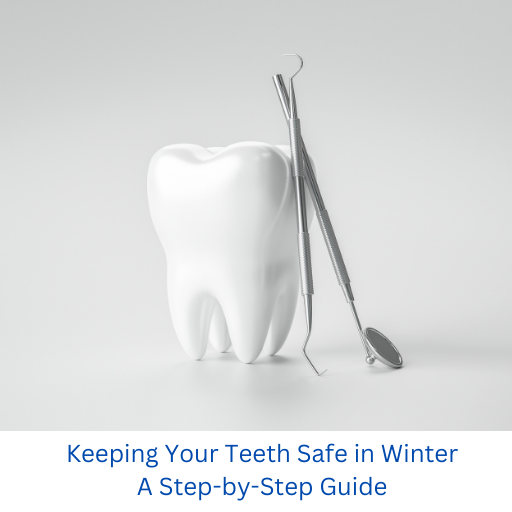
As the winter season unfolds, bringing not only chilly temperatures but also unique challenges for oral health, it becomes crucial to prioritize Teeth Safe in Winter. In this comprehensive guide, we delve into the importance of winter tooth care, offering cold-weather dental tips, insights on protecting teeth in winter, and a step-by-step winter dental care guide. Discover the essential winter oral hygiene tips, and tooth safety precautions, and learn how to keep your teeth in optimal health during the colder months while ensuring Teeth Safe in Winter remains a top priority.
SUMMARY
A. Winter Tooth Care: Understanding the Essentials
3. Winter Oral Health Precautions
4. Tooth Safety in Cold Weather
B. Caring for Teeth in the Winter Season: A Step-by-Step Guide
Step 3: Choose Tooth-Friendly Foods
Step 5: Schedule a Dental Check-Up
A. Winter Tooth Care: Understanding the Essentials
1. Cold Weather Dental Tips:
The winter weather can take a toll on your oral health. Explore practical cold-weather dental tips, including the use of lip balm, staying hydrated, and avoiding excessive consumption of hot or cold beverages to protect your teeth.
As the winter weather sets in, it’s essential to pay extra attention to your oral health to combat the potential challenges posed by the cold temperatures. Embracing practical cold-weather dental tips can help safeguard your teeth and gums during the winter months. One crucial tip is to use lip balm regularly. Cold, windy conditions can lead to chapped lips, and applying lip balm helps prevent this while also protecting the delicate skin around your mouth.
Staying hydrated is another key aspect of maintaining oral health in cold weather. The dry, cold air can contribute to dehydration, which may affect saliva production. Saliva is crucial for neutralizing acids and maintaining a healthy oral environment. Ensuring you drink an adequate amount of water helps combat dehydration and supports optimal saliva production.
Additionally, it’s advisable to be mindful of your beverage choices during the winter. Excessive consumption of hot or cold beverages, like coffee or ice-cold water, can impact tooth sensitivity. Moderation and using a straw to minimize direct contact with teeth can be helpful strategies.
2. Protecting Teeth in Winter:
Learn about effective strategies for protecting teeth in winter. From wearing a scarf to cover your mouth to choosing tooth-friendly foods, discover practical ways to shield your teeth from the harsh winter elements.
As winter unfolds, taking proactive steps to protect your teeth becomes paramount. One effective strategy is to wear a scarf that covers your mouth. This not only provides warmth but also acts as a barrier against cold winds that can contribute to tooth sensitivity. By shielding your mouth from direct exposure to the chilly air, you reduce the risk of discomfort associated with temperature-sensitive teeth.
Additionally, being mindful of your food choices during winter plays a crucial role in dental protection. Opt for tooth-friendly foods that promote oral health. Incorporate items rich in calcium and vitamin D, such as dairy products and leafy greens, into your diet. These nutrients strengthen teeth and support overall dental well-being.
Moreover, maintaining good oral hygiene practices is fundamental in the winter months. Regular brushing, flossing, and using an antiseptic mouthwash help remove plaque and bacteria, preventing issues like cavities and gum disease. Consistent oral care routines contribute to the longevity of your teeth, ensuring they stay healthy and resilient throughout the winter season.
3. Winter Oral Health Precautions:
Winter oral health requires special precautions. Understand the impact of cold weather on your teeth and implement precautions such as using a humidifier to combat dry air, which can contribute to oral discomfort.
Winter brings not only chilly temperatures but also unique challenges for maintaining optimal oral health. Cold weather can contribute to dry air, and when this dryness affects the oral cavity, it may lead to discomfort such as dry mouth and irritated gums. To combat this, consider using a humidifier in your living spaces. The humidifier helps add moisture to the air, preventing excessive dryness that can impact the delicate tissues of your mouth.
Dry air isn’t the only concern during winter; the season often comes with an increase in illnesses like the flu and the common cold. These can indirectly affect oral health, as medications, congestion, and dehydration may play a role in dental issues. Staying hydrated by drinking plenty of water and maintaining good oral hygiene practices becomes crucial during this time.
Moreover, be mindful of potential teeth sensitivity during winter. The cold air can exacerbate existing sensitivity issues, making it uncomfortable to eat or drink hot or cold items. If you experience increased sensitivity, consider using toothpaste designed for sensitive teeth and consult with your dentist for personalized recommendations.
In essence, winter oral health precautions involve a holistic approach, including combating dry air with humidifiers, staying hydrated, and addressing teeth sensitivity concerns. By taking these precautions, you can navigate the winter season with a focus on maintaining a healthy and comfortable smile.
4. Tooth Safety in Cold Weather:
Cold weather tooth protection goes beyond bundling up. Delve into the importance of wearing mouthguards during winter sports activities and adopting habits that minimize exposure to extreme temperature changes.
As the winter season unfolds, safeguarding your teeth extends beyond simply dressing warmly. Engaging in winter sports activities, especially those involving speed and physical contact, presents potential risks to your oral health. To protect your teeth during these activities, consider the importance of wearing a mouthguard. Mouthguards act as a barrier, absorbing the impact of potential blows to the face and minimizing the risk of dental injuries.
In addition to sporting precautions, adopting habits that reduce exposure to extreme temperature changes is essential. Rapid transitions between hot and cold environments, such as stepping from a heated indoor space into the chilly outdoor air, can contribute to tooth sensitivity. This sensitivity arises from the contraction and expansion of dental enamel in response to temperature fluctuations.
To mitigate this, be mindful of your surroundings and cover your mouth with a scarf or other protective gear when braving the cold. This extra layer not only shields you from the brisk air but also helps maintain a more consistent temperature for your teeth.
Incorporating these practices into your winter routine promotes tooth safety and reduces the risk of injuries or discomfort associated with cold weather. By embracing both proactive measures and protective gear, you contribute to the overall well-being of your oral health during the winter months.
B. Caring for Teeth in the Winter Season: A Step-by-Step Guide
Step 1: Stay Hydrated:
Combat the drying effects of winter by staying hydrated. Adequate water intake helps maintain saliva production, which is essential for neutralizing acids and protecting your teeth.
Step 2: Maintain Oral Hygiene:
Winter dental care is incomplete without maintaining proper oral hygiene. Brush and floss regularly, paying extra attention to your gums and tongue to prevent the buildup of bacteria.
Step 3: Choose Tooth-Friendly Foods:
Opt for tooth-friendly foods rich in vitamins and minerals. Include crunchy fruits and vegetables in your diet, which not only promote overall health but also help clean your teeth naturally.
Step 4: Limit Sugar Intake:
Be mindful of your sugar intake, especially during the winter season. Sugary treats are abundant during the holidays, and reducing their consumption helps protect your teeth from decay.
Step 5: Schedule a Dental Check-Up:
Prioritize your winter oral health by scheduling a dental check-up. Regular dental visits allow your dentist to identify and address any potential issues before they escalate.
FAQ
Q1: Can cold weather cause tooth sensitivity?
A1: Yes, cold weather can contribute to tooth sensitivity. Taking precautions like using toothpaste for sensitive teeth and avoiding extreme temperature changes can help manage sensitivity during winter.
Q2: How does winter dry air affect oral health?
A2: Winter dry air can lead to dry mouth and discomfort. Using a humidifier indoors helps maintain moisture levels, preventing dry mouth and supporting optimal oral health.
Q3: Are there specific foods that promote winter dental health?
A3: Yes, crunchy fruits and vegetables like apples and carrots can naturally clean your teeth. Additionally, dairy products rich in calcium contribute to strong teeth and bones.
Q4: Should I wear a mouthguard in winter sports?
A4: Yes, wearing a mouthguard during winter sports is crucial for tooth safety. Mouthguards protect against potential injuries during activities like skiing, snowboarding, or ice hockey.
Q5: How can I prevent winter-related bad breath?
A5: To prevent winter-related bad breath, stay hydrated, practice good oral hygiene, and consider using a tongue scraper. Regular dental check-ups can also address any underlying issues contributing to bad breath.
Conclusion:
Taking proactive steps for winter tooth care is essential for maintaining optimal oral health. By incorporating these tips into your routine, you can ensure that your teeth stay safe, healthy, and happy throughout the colder months.
For personalized assistance or to schedule a consultation, don’t hesitate to reach out to our dedicated team at (267) 908-4867. Your smile is our top priority, and we are steadfast in our commitment to providing you with the information and support needed to make your dental experience both comfortable and successful. Trust us to prioritize your oral health journey, and we eagerly anticipate being a partner in your quest for a healthy and radiant smile.









